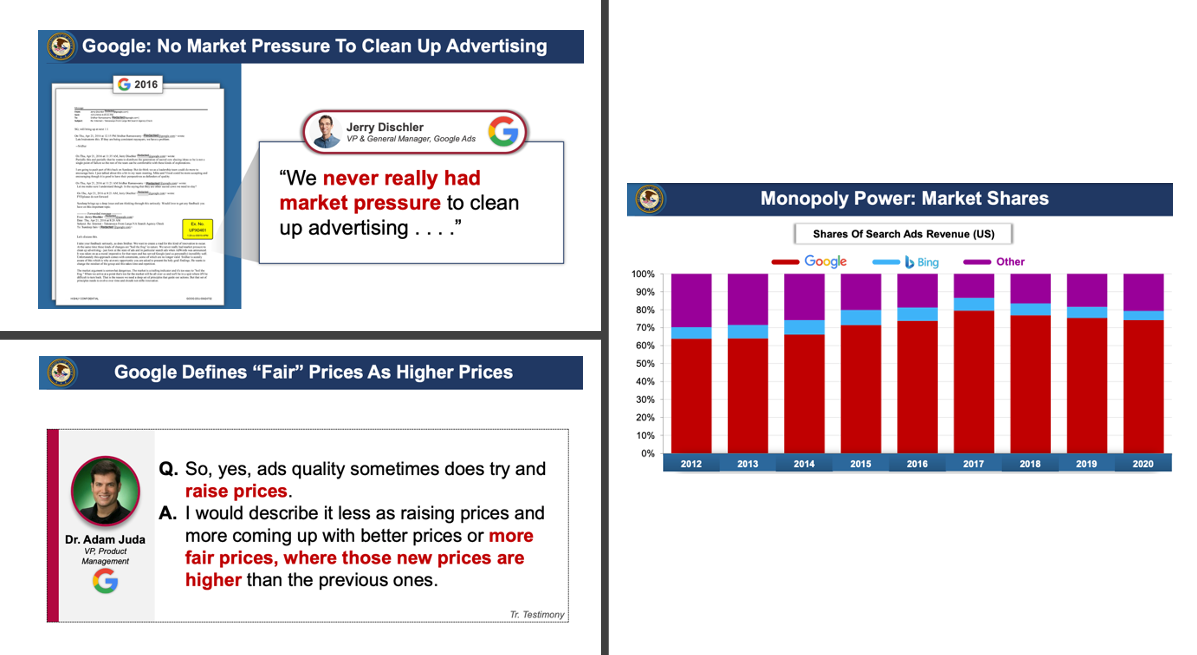Google PPC Games, Search.ChatGPT, Pichai Evades

Google Ad-Price Manipulation
Last week Google and the US Department of Justice (DOJ) presented closing arguments in the company's long-running antitrust case that focused on Google's default search payments to Apple (among others) and its alleged anticompetitive manipulation of search advertising. The case won't be formally decided by the judge for at least a couple of months. But if the judge finds liability there will be a new proceeding to determine remedies. It's unlikely Google will escape at least some liability. In conjunction with the trial's conclusion, the DOJ publicly released its closing slide presentation. The deck doesn't focus on Apple and default search; it details Google's alleged manipulation of paid search ad prices in order to meet Wall Street revenue expectations. It also argues there's no practical substitute for Google search advertising and seeks to rebut the argument that Google has a wide range of competitors (i.e., search and display are not equivalent). The deck is 143 pages but presents a solid argument and evidence, often using the testimony of Google employees to make its case.

Our take:
- The deck is persuasive. It suggests how much Google has changed and now focused on revenue optimization almost single-mindedly.
- In terms of default search, Google argued at trial: "we're simply the best search engine," that's why people choose us. That's partly true but ...
- If so, as a matter of common sense, why does Google need to pay Apple $20 billion a year for the "default search" position in Safari?
Search.ChatGPT Is Coming
Not long ago the rumor appeared that OpenAI was developing a bona fide search engine and Google (and Bing) competitor. That was based in part on the discovery of the subdomain search.chatgpt.com, which is currently "not found." But more reports have surfaced that the effort is real. The Information and Bloomberg both independently reported that ChatGPT search is happening. Apparently it will be part of ChatGPT. According to Bloomberg, "The feature would allow users to ask ChatGPT a question and receive answers that use details from the web with citations to sources such as Wikipedia entries and blog posts ... One version of the product also uses images alongside written responses to questions, when they’re relevant." The Verge adds, "Sources also tell The Verge that OpenAI has been aggressively trying to poach Google employees for a team that is working hard to ship the product soon." Google is expected to announce a formal rollout of SGE-AI Answers at Google I/O next week. There was speculation that the OpenAI search engine could launch this week to preempt that announcement.

Our take:
- There are dozens of brand rankings. Google is always in the top 5 if not the top three – though there's dissatisfaction according to multiple anecdotal reports.
- It's possible Google has lost ~2 points of market share since the fall. Younger users appear to be favoring social for discovery in some cases.
- A ChatGPT search engine doesn't guarantee success. People who predicted Google's downfall when ChatGPT arrived (11/22) were obviously wrong.
Nothing Wrong, We're Just Innovating
In a new Bloomberg interview with Google CEO Sundar Pichai, he's questioned about search quality, AI competition and potential disruption of Google's business model. Reporter Emily Chang asks whether "search is getting worse." Pichai responds with a kind of non-answer: "Anytime there's a transition, you get an explosion of new content, and AI is going to do that. So for us, we view this as the challenge ... So doing that well is what will define a high-quality product, and I think it's gonna be the heart of what makes Search successful." He confidently explains Google ad revenue won't be compromised by SGE. "As we are rolling out AI or views in Search, we've been experimenting with ads, and the data we see shows that those fundamental principles will hold true during this phase as well." And when asked whether AI-generated content will "ruin search," Pichai says, "How do you have a notion of what's objective and real in a world where there's gonna be a lot of synthetic content? ... We are making progress, but it's gonna be an ongoing journey." Finally, Chang mentions regulatory pressure and potential divestiture. Pichai blithely asserts, "A lot of our products integrate in a way that provides value for our users."
Our take:
- Pichai is an affable figure but he intentionally equivocates and doesn't directly address reporter Chang's questions. Unfortunately, she doesn't follow up.
- Chang asks about threats to Google's future. "Our biggest threat is not executing well," he suggests. It's already happening.
- The general tone and content of Pichai's remarks is: nothing is wrong at Google, we're busy innovating.
Recent Analysis
- Is Google Replacing LSA Reviews with GBP Reviews?, by Mike Blumenthal.
- Near Media podcast episode 155: An interview with Dana DiTomaso: to Google GA4 analytics Hell and back again.
Short Takes
- New layout for reporting and replying to reviews on GBP.
- 50 local SEO tips to rank better on Google Maps.
- Using local pack grid rankings for competitive local SEO analysis.
- Google testing product review summaries with one-word titles.
- Why the March 2024 Core Update was unique.
- Google uses iPhone action button to bring "Circle to Search" to iOS.
- MSFT Copilot getting auto-complete feature for better AI prompts.
- Bing tests SERP changes that clearly distinguish ads from content.
- TikTok e-commerce sellers are diversifying to other social sites.
- Low quality AI-generated articles are all over A-list media sites.
- Slop: A new term of art for unwanted AI content.
- Amherst professor turns Section 230 against big tech.
Listen to our latest podcast.

How can we make this better? Email us with suggestions and recommendations.

